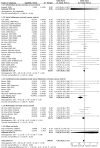Effectiveness of school-based smoking prevention curricula: systematic review and meta-analysis
- PMID: 25757946
- PMCID: PMC4360839
- DOI: 10.1136/bmjopen-2014-006976
Effectiveness of school-based smoking prevention curricula: systematic review and meta-analysis
Abstract
Objective: To assess effectiveness of school-based smoking prevention curricula keeping children never-smokers.
Design: Systematic review, meta-analysis.
Data: MEDLINE (1966+), EMBASE (1974+), Cinahl, PsycINFO (1967+), ERIC (1982+), Cochrane CENTRAL, Health Star, Dissertation Abstracts, conference proceedings.
Data synthesis: pooled analyses, fixed-effects models, adjusted ORs. Risk of bias assessed with Cochrane Risk of Bias tool.
Setting: 50 randomised controlled trials (RCTs) of school-based smoking curricula.
Participants: Never-smokers age 5-18 (n=143,495); follow-up ≥6 months; all countries; no date/language limitations.
Interventions: Information, social influences, social competence, combined social influences/competence and multimodal curricula.
Outcome measure: Remaining a never-smoker at follow-up.
Results: Pooling all curricula, trials with follow-up ≤1 year showed no statistically significant differences compared with controls (OR 0.91 (0.82 to 1.01)), though trials of combined social competence/social influences curricula had a significant effect on smoking prevention (7 trials, OR 0.59 (95% CI 0.41 to 0.85)). Pooling all trials with longest follow-up showed an overall significant effect in favour of the interventions (OR 0.88 (0.82 to 0.95)), as did the social competence (OR 0.65 (0.43 to 0.96)) and combined social competence/social influences curricula (OR 0.60 (0.43 to 0.83)). No effect for information, social influences or multimodal curricula. Principal findings were not sensitive to inclusion of booster sessions in curricula or to whether they were peer-led or adult-led. Differentiation into tobacco-only or multifocal curricula had a similar effect on the primary findings. Few trials assessed outcomes by gender: there were significant effects for females at both follow-up periods, but not for males.
Conclusions: RCTs of baseline never-smokers at longest follow-up found an overall significant effect with average 12% reduction in starting smoking compared with controls, but no effect for all trials pooled at ≤1 year. However, combined social competence/social influences curricula showed a significant effect at both follow-up periods.
Systematic review registration: Cochrane Tobacco Review Group CD001293.
Keywords: PREVENTIVE MEDICINE; PUBLIC HEALTH.
Published by the BMJ Publishing Group Limited. For permission to use (where not already granted under a licence) please go to http://group.bmj.com/group/rights-licensing/permissions.
Figures
References
-
- Epstein JA, Griffin KW, Botvin GJ. A model of smoking among inner-city adolescents: the role of personal competence and perceived social benefits of smoking. Prev Med 2000;31: 107–14. - PubMed
-
- Centers for Disease Control and Prevention. Youth Risk Behavior Surveillance—United States, 2007. Morbidity and Mortality Weekly Report. June 6, 2008;57(SS-04).
-
- NHS Information Centre (2012). Smoking, drinking and drug use among young people in England. http://www.ash.org.uk/files/documents/ASH_108.pdf (accessed 11 Apr 2014).
Publication types
MeSH terms
Grants and funding
LinkOut - more resources
Full Text Sources
Other Literature Sources



